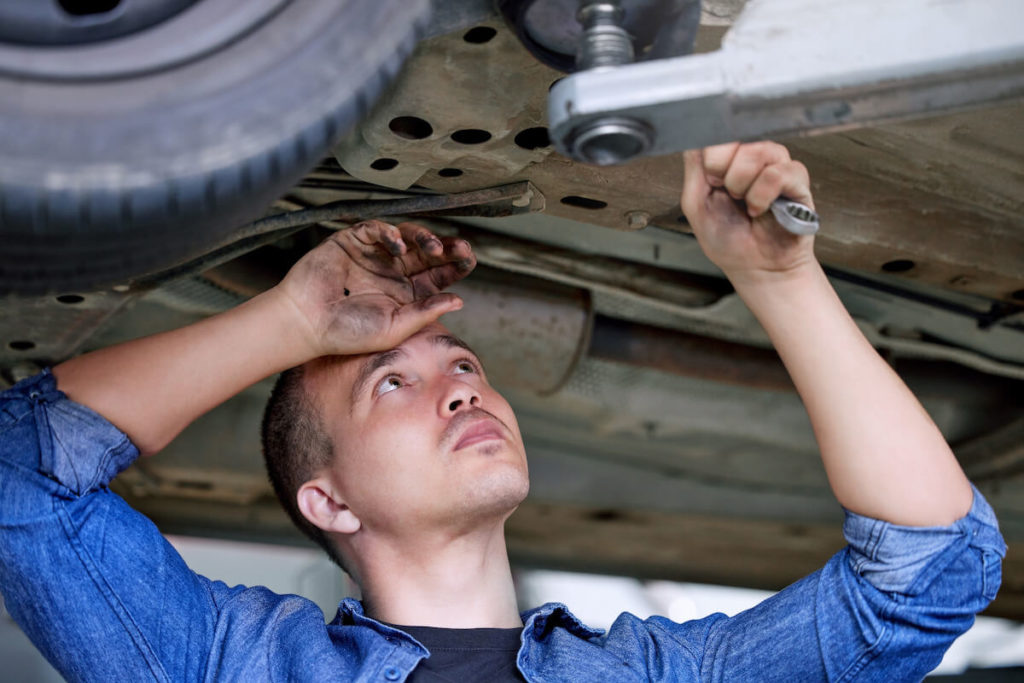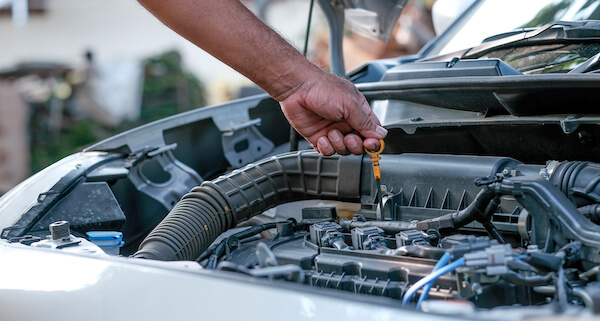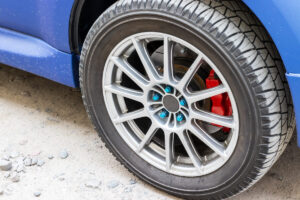Oil in a vehicle’s engine is similar to blood in the human body. Like blood, oil nourishes various parts, removes impurities, and helps regulate temperature. The body can’t survive without blood, and neither can an engine without oil.
The most common sign of oil leaking from the engine is droplets of oil under the vehicle where you park. Other signs of oil leaks include a smoky exhaust, the smell of burning engine oil inside the cabin, a lit oil light, and overheating.
Today, I’ll explain just how serious oil leaks are and why you should fix an oil leak as soon as possible.

How Serious Is a Subaru Engine Oil Leak?
A severe oil leak can have disastrous effects on your engine. Oil leaks aren’t rare but can cause significant damage, especially if left unattended. The damage can worsen, losing more oil. The leaked oil can also damage other parts of the engine and car.
Complete Engine Failure
One of the principal roles of engine oil is lubrication – the oil prevents car parts from grinding and wearing each other out. Without engine oil, the inner parts of the engine have no lubrication.
One of the signs of an oil leak is engine noise— without lubrication, the engine parts rub together, producing unpleasant sounds. The engine parts will seize eventually, causing complete engine failure.
It’s difficult and expensive to fix a seized engine, as the most common solution is a costly engine replacement.
Overheating
The engine’s cooling system shoulders most of the cooling responsibilities in the engine, with the oil playing a minor but important role in keeping engine oil temperatures in check.
The oil lubricates the engine, reducing friction between moving parts. As the oil leaks, friction increases, raising engine temperatures and overwhelming the cooling system.
An overheating warning might come as a surprise, especially if the cooling system has no obvious fault. When this happens, low oil levels are a common culprit.
Of course, an overheating engine is far from a good thing. However, it can sometimes be a blessing in disguise as it’s typically a precursor to more serious issues like a broken-down engine. As a result, it’s important to take your car to a trusted mechanic if overheating becomes a concern.

Can You Drive a Car With an Oil Leak From the Engine?
You can drive a car with oil leaking from the engine. However, it’s inadvisable to do so without ensuring the engine has enough oil to reach your destination. While the car will work with an oil leak, enough oil lost will eventually damage the engine, leading to costly repairs.
Don’t start the engine if you notice a large oil pool under the car. Your car could have lost so much oil that attempting to crank it will irreversibly destroy the engine.
A few drops of oil shouldn’t worry you, especially if you’ve recently done some work on the engine. It’s likely that some oil got spilled in the engine bay and has slowly traveled to the bottom of the engine.
However, if no work has been done on your engine recently, oil under your engine should concern you as it’s likely a sign of a deeper problem.
After spotting an oil leak, follow these steps before starting the vehicle:
- Open the hood and locate the oil dipstick.
- Pull out the dipstick and wipe off the oil at its tip.
- Insert the dipstick and wait for a few seconds.
- Withdraw the dipstick and note the oil level: it should be between the maximum and minimum markers. If it is, you can safely drive the vehicle to a mechanic to locate the leak.
- If the dipstick shows the oil level is below the minimum, do not start the car before topping up the oil.
It’s safer to have the leaking car towed to the mechanic than to drive it. Since it’s much harder to notice an oil leak when driving a vehicle, it’s difficult to judge how fast the engine is leaking. If the leak is significant enough, the oil could drop to critical levels before you get to the mechanic.
With a little knowledge, you can try to identify the leak’s source. In Subarus, the valve gasket cover is one of the most common oil leak culprits. High engine temperatures and age weaken the gasket cover, allowing oil to seep through.
A leak caused by a failed gasket cover isn’t serious. After topping off the oil, you can drive for a while before asking a mechanic to fix the leak.
If you can’t find the source of the leak, it’s best to have a mechanic find and seal the leak before you drive the vehicle.
In emergency situations, you can use “oil stop leaks” to temporarily stop oil leaks. Oil stop leaks are cheap oil additives designed to resolve oil leaks.
Oil stop leaks aren’t permanent solutions to oil leaks and can cause more damage if used incorrectly. However, they can solve your oil leak issue long enough for you to get to a mechanic.
How To Identify Common Oil Leaks On A Subaru
- Oil on the top of the engine block
- Oil underneath the engine block between the cylinder heads
- Oil build-up on the cross member
- Oil build-up on the exhaust manifold
- Oil builds up underneath the front of the car
For even more tips on identifying Subaru oil leaks, read here.
Here is a very helpful video from MRT Performance showing how to identify an engine oil leak on a Subaru FA/FB series engine.
Are Engine Oil Leaks Worth Fixing?
Even after reading the above, you might be tempted to ignore the oil leak or trust that cheap oil stop additives will fix the problem. Unfortunately, oil leaks rarely go away on their own. In fact, they tend to worsen with time.
Engine oil leaks are worth fixing since they damage the car otherwise. By fixing an oil leak, you restore the engine to optimum performance and save yourself from the potential extra costs of engine replacement, allowing you to savor the performance of your BMW or Subaru without worry.
The longer you wait to seal an oil leak, the more you will likely pay to fix the issue. Oil leaks get worse over time. A minor leak will gradually grow, allowing increasing amounts of oil through. An oil leak that you assume is minor can spiral out of control rapidly.
When you first notice the leak, a quick trip to the mechanic will likely solve the problem.
How Much Does It Cost To Fix a Subaru Engine Oil Leak?
The cost of fixing an oil leak can range from as low as $400 to as high as $2,000. Factors like the source of the leak, vehicle model, and extent of the damage all affect the final cost of the repair.
It might seem like a mechanic’s ploy to get paid more, but each of the above problems can have a profound effect on the leak and by extension, the difficulty of the repair.
Source of the Leak
The first thing a competent mechanic will do is identify the source of the oil leak. Subaru engines, especially old ones, often leak oil from worn seals. Without experience, finding the seal that’s leaking can be difficult.
However, technicians skilled in repairing engines will find the leak fairly quickly as they know where to look.
The source of the leak matters because it’ll determine how much you’ll pay for labor and replacement parts. If the parts you need to replace are expensive, the cost of fixing the leak rises. Similarly, the longer it takes for a mechanic to fix the leak, the longer you will have to pay.
Subaru engines can be notoriously complicated, making oil leak repair expensive due to the time taken by the technician to complete the fix.
At SL Autoworks, we have experts that’ll find and fix the oil leak in your Subaru as quickly as possible, reducing repair costs for high-quality service.
Model of the Vehicle
Old vehicles are more likely to suffer oil leaks. In general, old cars spend more time in mechanic shops due to the wear on their parts from use. Though old cars regularly visit the shop, the repair jobs are relatively straightforward and cheap. Old designs are typically less complicated, facilitating quick repairs.
Cars have become more complex as manufacturers seek to one-up their competitors. In 2016, an executive from the National Association of Bodyshops told Autocar that a Mercedes S-Class had more lines of code than a Boeing Dreamliner!
The improvements have made vehicles safer, greener, more comfortable, and more fun. However, the complexity has made vehicles more expensive to repair.
Oil repair jobs in old-spec vehicles generally cost less than in newer models. For instance, the cost of repairing a typical oil leak in a 2008 BMW is over two times the price of fixing a similar leak in a 2002 BMW.
Therefore, the newer the car model, the higher the expected cost of oil leak repair.
Extent of the Damage
Engines aren’t designed to leak oil. Therefore, even a minor leak can cause unexpected damage to your vehicle.
Oil leaks get worse as time progresses: the longer you wait to fix the leak, the higher you’ll likely pay for the repair.
If the leak causes damage to other engine parts, you’ll pay more to repair the extra damage. It’s part of the reason why we suggest that you have a mechanic fix the oil leak as soon as possible.

Don’t Wait To Fix Your Subaru Oil Leak
Oil leaks can cause catastrophic engine failure if left unattended. Engine parts without lubrication from the oil can grind and wear on each other so much that it destroys the motor.
Therefore, it’s vital that you have a mechanic seal the leak as soon as possible. Fixes like oil leak stops are temporary and unlikely to get to the root of the problem.
We advise you to entrust your leaking vehicle to a reputable mechanic. Contact us to find out the approximate cost of oil leak repair on your vehicle.



